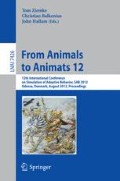Abstract
This article studies how a robot can learn nouns and adjectives in language. Towards this end, we extended a framework that enabled robots to learn affordances from its sensorimotor interactions, to learn nouns and adjectives using labeling from humans. Specifically, an iCub humanoid robot interacted with a set of objects (each labeled with a set of adjectives and a noun) and learned to predict the effects (as labeled with a set of verbs) it can generate on them with its behaviors. Different from appearance-based studies that directly link the appearances of objects to nouns and adjectives, we first predict the affordances of an object through a set of Support Vector Machine classifiers which provided a functional view of the object. Then, we learned the mapping between these predicted affordance values and nouns and adjectives. We evaluated and compared a number of different approaches towards the learning of nouns and adjectives on a small set of novel objects.
The results show that the proposed method provides better generalization than the appearance-based approaches towards learning adjectives whereas, for nouns, the reverse is the case. We conclude that affordances of objects can be more informative for (a subset of) adjectives describing objects in language.
Access this chapter
Tax calculation will be finalised at checkout
Purchases are for personal use only
Preview
Unable to display preview. Download preview PDF.
References
Harnad, S.: The symbol grounding problem. Physica D: Nonlinear Phenomena 42(1-3), 335–346 (1990)
Borghi, A.M.: Object concepts and embodiment: Why sensorimotor and cognitive processes cannot be separated. La Nuova Critica 49(50), 90–107 (2007)
Gibson, J.J.: The ecological approach to visual perception. Lawrence Erlbaum (1986)
Dag, N., Atil, I., Kalkan, S., Sahin, E.: Learning affordances for categorizing objects and their properties. In: IEEE ICPR. IEEE (2010)
Atil, I., Dag, N., Kalkan, S., Şahin, E.: Affordances and emergence of concepts. In: Epigenetic Robotics (2010)
Yu, C., Ballard, D.H.: On the integration of grounding language and learning objects. In: Proc. 19th Int. Conf. on Artifical Intelligence, AAAI 2004, pp. 488–493. AAAI Press (2004)
Carbonetto, P., de Freitas, N.: Why can’t jose read? the problem of learning semantic associations in a robot environment. In: Proc. the HLT-NAACL 2003 Workshop on Learning Word Meaning from Non-Linguistic Data, pp. 54–61 (2003)
Nehaniv, C.L., Saunders, J., Lyon, C.: Robot learning of lexical semantics from sensorimotor interaction and the unrestricted speech of human tutors. In: Proc. 2nd Int. Symp. New Frontiers Human-Robot Interact. ASIB Convent. (2010)
Cangelosi, A.: Evolution of communication and language using signals, symbols, and words. IEEE Tran. on Evolutionary Computation 5(2), 93–101 (2001)
Cangelosi, A.: Grounding language in action and perception: From cognitive agents to humanoid robots. Physics of Life Reviews 7(2), 139–151 (2010)
Şahin, E., Çakmak, M., Doğar, M.R., Uğur, E., Üçoluk, G.: To afford or not to afford: A new formalization of affordances toward affordance-based robot control. Adaptive Behavior 15(4), 447–472 (2007)
Montesano, L., Lopes, M., Bernardino, A., Santos-Victor, J.: Learning object affordances: From sensory–motor coordination to imitation. IEEE Tran. on Robotics 24(1), 15–26 (2008)
Stoytchev, A.: Learning the Affordances of Tools Using a Behavior-Grounded Approach. In: Rome, E., Hertzberg, J., Dorffner, G. (eds.) Towards Affordance-Based Robot Control. LNCS (LNAI), vol. 4760, pp. 140–158. Springer, Heidelberg (2008)
Kraft, D., Pugeault, N., Baseski, E., Popovic, M., Kragic, D., Kalkan, S., Wörgötter, F., Krüger, N.: Birth of the object: Detection of objectness and extraction of object shape through object action complexes. International Journal of Humanoid Robotics 5(2), 247–265 (2008)
Ugur, E., Şahin, E.: Traversability: A case study for learning and perceiving affordances in robots. Adaptive Behavior 18(3-4), 258–284 (2010)
Fitzpatrick, P., Metta, G., Natale, L., Rao, S., Sandini, G.: Learning about objects through action - initial steps towards artificial cognition. In: IEEE ICRA (2003)
Detry, R., Kraft, D., Buch, A.G., Kruger, N., Piater, J.: Refining grasp affordance models by experience. In: IEEE ICRA, pp. 2287–2293 (2010)
Ugur, E., Oztop, E., Şahin, E.: Goal emulation and planning in perceptual space using learned affordances. Robotics and Autonomous Systems 59(7-8) (2011)
Ugur, E., Şahin, E., Oztop, E.: Affordance learning from range data for multi-step planning. In: Int. Conf. on Epigenetic Robotics (2009)
Montesano, L., Lopes, M., Bernardino, A., Santos-Victor, J.: A computational model of object affordances. In: Advances in Cognitive Systems. IET (2009)
Sinapov, J., Stoytchev, A.: Learning and generalization of behavior-grounded tool affordances. In: IEEE 6th International Conference on Development and Learning, ICDL 2007, pp. 19–24 (July 2007)
Sinapov, J., Stoytchev, A.: Detecting the functional similarities between tools using a hierarchical representation of outcomes. In: 7th IEEE International Conference on Development and Learning, ICDL 2008, pp. 91–96 (August 2008)
Montesano, L., Lopes, M., Bernardino, A., Santos-Victor, J.: Learning object affordances: From sensory–motor coordination to imitation. IEEE Tran. on Robotics 24(1), 15–26 (2008)
Montesano, L., Lopes, M., Melo, F., Bernardino, A., Santos-Victor, J.: A computational model of object affordances. Advances in Cognitive Systems 54, 258 (2009)
Rusu, R.B., Cousins, S.: 3d is here: Point cloud library (pcl). In: IEEE ICRA, pp. 1–4. IEEE (2011)
Kira, K., Rendell, L.A.: A practical approach to feature selection. In: Proc. 9th Int. Workshop on Machine Learning, pp. 249–256 (1992)
Qin, A.K., Suganthan, P.N.: Robust growing neural gas algorithm with application in cluster analysis. Neural Networks 17(8-9), 1135–1148 (2004)
Author information
Authors and Affiliations
Editor information
Editors and Affiliations
Rights and permissions
Copyright information
© 2012 Springer-Verlag Berlin Heidelberg
About this paper
Cite this paper
Yürüten, O., Uyanık, K.F., Çalışkan, Y., Bozcuoğlu, A.K., Şahin, E., Kalkan, S. (2012). Learning Adjectives and Nouns from Affordances on the iCub Humanoid Robot. In: Ziemke, T., Balkenius, C., Hallam, J. (eds) From Animals to Animats 12. SAB 2012. Lecture Notes in Computer Science(), vol 7426. Springer, Berlin, Heidelberg. https://doi.org/10.1007/978-3-642-33093-3_33
Download citation
DOI: https://doi.org/10.1007/978-3-642-33093-3_33
Publisher Name: Springer, Berlin, Heidelberg
Print ISBN: 978-3-642-33092-6
Online ISBN: 978-3-642-33093-3
eBook Packages: Computer ScienceComputer Science (R0)

